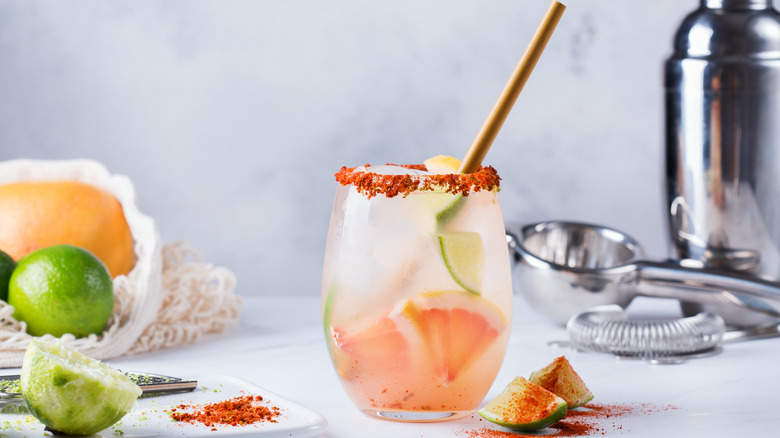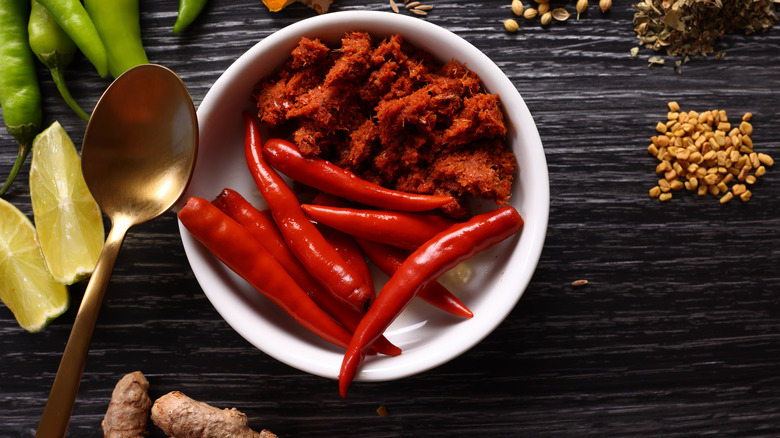Add This To A Glass Of Water To Protect Your Heart
Getting enough water every day is essential to your health. According to The Heart Foundation, 60% of your body weight is made up of water, so not getting enough can cause a significant knot in the system and lead to dehydration. It's also vital to keeping your body in balance and your heart running at peak performance since it's pumping 2,000 gallons of blood daily.
A 2022 study in the European Heart Journal noted that chronic dehydration and lack of proper hydration can be associated with an increased risk of heart failure. Natalia Dmitrieva, Ph.D. lead study author, told the National Institutes of Health, "Similar to reducing salt intake, drinking enough water and staying hydrated are ways to support our hearts and may help reduce long-term risks for heart disease." But there are other ways you can support your health in a tall glass of water. Try adding a little bit of cayenne pepper.
In addition to giving it a little heat, cayenne pepper contains capsaicin and potassium, which are known to support your heart. Explore how this spicy addition gives your heart health a bit of extra zest.
Capsaicin is good for the heart
When you think of cayenne pepper, it typically brings about images of rich curries or chilies rather than slipping it into your water. However, just like having a little lemon in your water, adding a dash of cayenne pepper is good for you. Not only will it give your water a little heat, but capsaicin, which gives chili peppers their spice, is known to open up the arteries.
According to 2015 research in Openheart, the transient receptor potential vanilloid 1 (TRPV1) is activated by capsaicin, meaning it allows an influx of calcium into the vessels to open them up. The publication also noted that TRPV1 cells protect the vessels against inflammation. Furthermore, a 2019 study in Experimental and Therapeutic Medicine showed that "capsaicin increases both expression and secretion of CGRP, a potent vasodilator and this process is mediated by TRPV1." In layman's terms, it keeps blood pumping through your veins and reduces inflammation.
What's more, Dr. DeLisa Fairweather, a Mayo Clinic cardiovascular disease researcher, stated, "There really could be important benefits that you could have from eating hot chili peppers, especially in their ability to reduce some of these immune cell responses that are driving atherosclerosis and heart attacks." Having a bit of cayenne pepper in your water can go a long way to keep your heart singing.
Potassium in cayenne peppers is good for the heart
Potassium is one of those nutrients your body can't live without, literally. It's used alongside sodium and other minerals to help keep you hydrated and rebuild tissues. It also has an electrical charge, which is why you might commonly hear it referred to as an electrolyte, per Medical News Today.
According to the U.S. Department of Agriculture (USDA), one tablespoon of cayenne pepper has 107 mg of potassium. An adult needs between 2,600 and 3,400 mg daily (via the National Institutes of Health). While a tablespoon isn't much, adding it to your water throughout the day can get you far in meeting your potassium goals alongside a heart-healthy diet. As far as your heart goes, WebMD noted potassium works for your heart by helping improve blood pressure, lower cholesterol through a heart-healthy diet, and keep your heart beating regularly.
A 2017 study in JCI Insight also showed that having too little dietary potassium could lead to calcification and stiffness of arteries, which leads to heart disease. Co-author Dr. Paul W. Sanders told the National Institutes of Health, "The findings have important translational potential since they demonstrate the benefit of adequate potassium supplementation on prevention of vascular calcification in atherosclerosis-prone mice, and the adverse effect of low potassium intake." Since calcification and stiffness make it hard for your arteries to do their job, it's a no-brainer that adding a bit of cayenne to an already good-for-you drink makes it even better.



